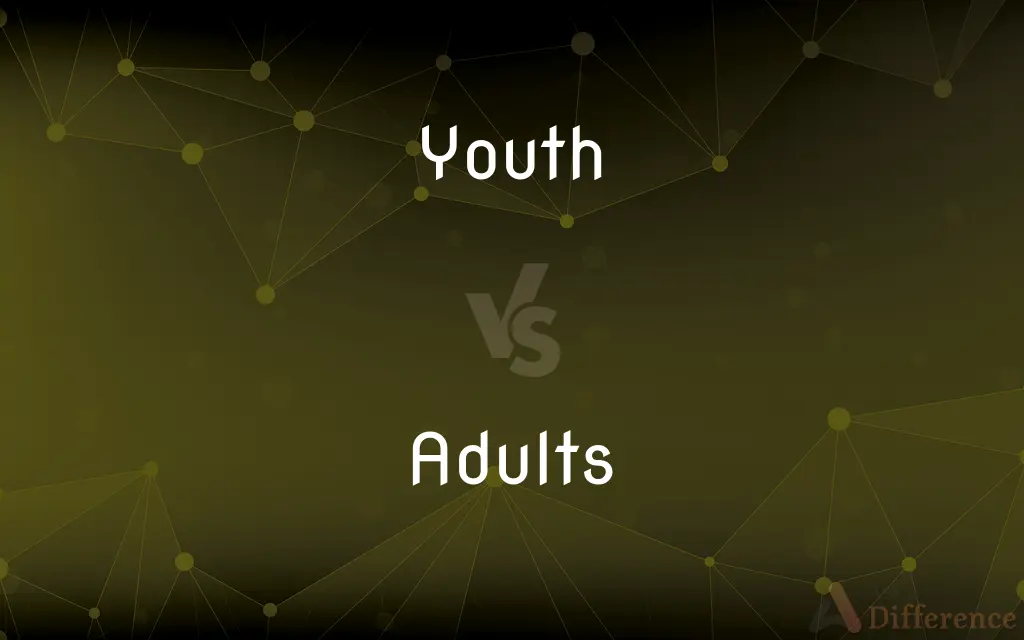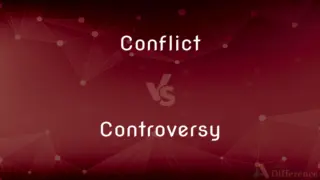Youth vs. Adults — What's the Difference?
Edited by Tayyaba Rehman — By Fiza Rafique — Published on November 29, 2023
Youth refers to the period of being young or the young people themselves, while adults are mature individuals, typically beyond the stage of adolescence.

Difference Between Youth and Adults
Table of Contents
ADVERTISEMENT
Key Differences
Youth and Adults represent two distinct stages of human life. The term "Youth" denotes the period between childhood and adulthood, characterized by growth, exploration, and learning. On the other hand, Adults refers to individuals who have reached maturity, both biologically and, in many societies, legally.
In many cultures, Youth is associated with a time of discovery, experimentation, and formation of identity. Adults, contrastingly, are expected to have a more settled phase of life, often taking on responsibilities such as employment, parenthood, or societal roles.
Physical and emotional changes mark the transition from Youth to adulthood. While Youth undergoes puberty and the associated emotional fluctuations, Adults have typically completed these transitions, leading to relative stability.
Both Youth and Adults offer unique perspectives based on their life experiences. Where Youth may provide fresh, innovative ideas and energy, Adults often bring experience, wisdom, and a broader understanding of complexities.
Finally, societal expectations differ for Youth and Adults. Youth might be seen as learners, still shaping their worldviews, while Adults are often expected to be providers, mentors, or leaders in their communities.
ADVERTISEMENT
Comparison Chart
Age Range
Typically teenagers to early 20s
Typically 21 or older
Responsibilities
Fewer, often focused on education
Greater, including work, family, etc.
Physical Stage
Undergoing puberty
Fully matured
Societal Role
Learners, explorers
Providers, mentors, leaders
Decision-making
Often guided by elders
Independent and accountable
Compare with Definitions
Youth
The period between childhood and adult age.
The Youth of today are the leaders of tomorrow.
Adults
Individuals who are mature and fully grown.
The film is suitable for Adults only.
Youth
Characterized by freshness and vigor.
His Youthful energy was evident in his actions.
Adults
Persons who have reached the age of majority.
Adults are expected to vote in the election.
Youth
A time of growth and learning.
During his Youth, he traveled extensively.
Adults
Beyond the stage of adolescence.
Most Adults have a regular job and responsibilities.
Youth
Individuals in the phase of being young.
The community center hosts events for the Youth.
Adults
Characterized by mature judgment or behavior.
She handles situations with an Adult's discretion.
Youth
The early stages of anything.
The company is still in its Youth.
Adults
One who has attained maturity or legal age.
Youth
The condition or quality of being young
Travel while you still have your youth.
Adults
(Biology) A fully grown, mature organism.
Youth
The time of life between childhood and maturity
He was rebellious in his youth.
Adults
Fully developed and mature.
Youth
An early period of development or existence
A nation in its youth.
Adults
Relating to, intended for, or befitting adults
Adult education.
Youth
A young person, especially a young male in late adolescence.
Adults
Containing or dealing in explicitly sexual material; pornographic
Adult movies.
Youth
(used with a sing. or pl. verb) Young people considered as a group.
Adults
Plural of adult
Youth
(Geology) The first stage in the erosion cycle.
Adults
Infl of adult
Youth
(uncountable) The quality or state of being young.
Her youth and beauty attracted him to her.
Adults
Legally responsible for their actions.
As an Adult, he was accountable for his decisions.
Youth
(uncountable) The part of life following childhood; the period of existence preceding maturity or age; the whole early part of life, from childhood, or, sometimes, from infancy, to adulthood.
Make the most of your youth, it will not last forever.
I made many mistakes in my youth, but learned from them all.
Youth
(countable) A young person.
There was a group of youths hanging around the parking lot, reading fashion magazines and listening to music.
Youth
(countable) A young man; a male adolescent or young adult.
Youth
Young persons, collectively.
Youth
The quality or state of being young; youthfulness; juvenility.
Such as in his faceYouth smiled celestial.
Youth
The part of life that succeeds to childhood; the period of existence preceding maturity or age; the whole early part of life, from childhood, or, sometimes, from infancy, to manhood.
He wondered that your lordshipWould suffer him to spend his youth at home.
Those who pass their youth in vice are justly condemned to spend their age in folly.
Youth
A young person; especially, a young man.
Seven youths from Athens yearly sent.
Youth
Young persons, collectively.
It is fit to read the best authors to youth first.
Youth
A young person (especially a young man or boy)
Youth
Young people collectively;
Rock music appeals to the young
Youth everywhere rises in revolt
Youth
The time of life between childhood and maturity
Youth
Early maturity; the state of being young or immature or inexperienced
Youth
An early period of development;
During the youth of the project
Youth
The freshness and vitality characteristic of a young person
Common Curiosities
At what age does one become an Adult?
Legally, adulthood often starts at 18 or 21, depending on the jurisdiction and context.
Are "Youth" and "teenagers" the same?
While they overlap, "Youth" can also include young people in their early 20s, whereas "teenagers" specifically refers to those aged 13-19.
Why is "Youth" sometimes associated with rebellion?
This association arises from the idea that Youth is a time of forming identity, questioning norms, and seeking independence.
Are Adults always responsible?
While society often expects Adults to be responsible, individual behavior varies.
How do societal expectations differ for Youth and Adults?
Youth are often seen as learners and explorers, while Adults are viewed as providers, mentors, or leaders.
Can "Youth" also refer to a young feeling?
Yes, "Youth" can metaphorically refer to feelings of freshness, vigor, or a young spirit.
Are all Adults mature?
While "Adult" denotes a biological and often legal state, maturity is subjective and can vary among individuals.
Can "Adult" be used as a verb?
Informally, yes. "Adulting" refers to performing tasks associated with adulthood.
Why are some movies restricted to Adults?
They might contain content deemed inappropriate or hard to understand for younger audiences.
Can "Youth" refer to a collective group?
Yes, "Youth" can refer to young people as a group, e.g., "The Youth are protesting."
Do Adults always have more life experience than Youth?
Generally, yes, due to age. However, individual experiences vary widely.
Why do some societies have rites of passage for Youth?
These rites often mark the transition from Youth to adulthood, emphasizing new roles and responsibilities.
Is the concept of "Youth" and "Adult" consistent worldwide?
While present everywhere, the age range and societal expectations for Youth and Adults can vary across cultures.
Is age the only criteria for being an Adult?
While age is a primary criterion, adulthood can also refer to behavior, maturity, or legal responsibilities.
Can an Adult also possess Youthful qualities?
Absolutely. Many Adults maintain qualities like curiosity, playfulness, and a willingness to learn, often described as "Youthful."
Share Your Discovery

Previous Comparison
Conflict vs. Controversy
Next Comparison
Offensive Behavior vs. Defensive BehaviorAuthor Spotlight
Written by
Fiza RafiqueFiza Rafique is a skilled content writer at AskDifference.com, where she meticulously refines and enhances written pieces. Drawing from her vast editorial expertise, Fiza ensures clarity, accuracy, and precision in every article. Passionate about language, she continually seeks to elevate the quality of content for readers worldwide.
Edited by
Tayyaba RehmanTayyaba Rehman is a distinguished writer, currently serving as a primary contributor to askdifference.com. As a researcher in semantics and etymology, Tayyaba's passion for the complexity of languages and their distinctions has found a perfect home on the platform. Tayyaba delves into the intricacies of language, distinguishing between commonly confused words and phrases, thereby providing clarity for readers worldwide.
















































